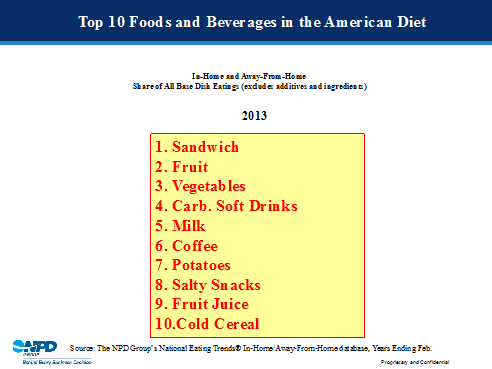Americans Eating Healthier, Stabilizing Obesity Levels
CHICAGO -- Americans are consuming more healthy foods such as fruit, yogurt and bottled water than they did a decade ago, which is contributing to a stabilization in the country’s obesity levels, according to The NPD Group’s 28th annual Eating Patterns in America report.
In fact, fruit now ranks second behind sandwiches on the list of top 10 foods Americans eat, surpassing milk, vegetables and carbonated soft drinks.
"Fruit is the No. 1 snack and dessert in the United States, and now makes up 7 percent of end dishes we consume," said Harry Balzer, chief industry analyst at NPD and author of the Eating Patterns in America report. "The movement toward more fruit over the last decade is, in my opinion, a movement toward the need for natural. Fruit is generally not processed and requires less preparation than many other foods."
According to NPD, the shift to a more natural diet is part of an effort by American families -- who spend on average 70 minutes per day eating -- to get back to basics.

"People are getting a handle on weight gain in this country. We may not yet be losing weight, but we've stopped gaining weight. You get a sense that the obesity trend has stabilized," Balzer noted.
NPD's eating trends research shows that more than 30 percent of U.S. adults today are obese, a statistic that has leveled off in the last few years. Over the last decade, NPD's data has shown that the number of Americans who are overweight -- with a body mass index of 25 or greater -- has not increased since 2003. The number of adults who are obese -- those with a body mass index of 30 or greater -- continued to increase until 2011, but has since stabilized and not increased.
"While health concerns play a role in the American diet, the cost of food and the need for convenient preparation are also major drivers in our food and beverage selections," Balzer concluded.
